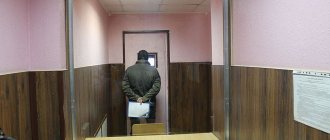Opportunity to improve
A suspended sentence is the possibility of canceling and replacing the real punishment in the form of imprisonment for citizens and disbat for military personnel. If the punishment does not exceed an eight-year term, the court may consider that the convicted person can reform without actually staying in a colony or prison (read more about correctional colonies in the Russian Federation here, and find out more about prisons in the Russian Federation in this material).
Also, a number of mitigating circumstances may be a condition - the crime was committed for the first time or without intent, the defendant was in a state of passion or defended himself. Then the sentence is considered a suspended sentence and the person can continue to live a normal life, while being under the supervision of the penitentiary services.
However, not every convicted person has a chance to get off with a suspended sentence. This possibility is completely excluded:
- Any sexual harassment of children under 14 years of age.
- Crimes related to terrorist activities.
- Attacks on foreigners and members of international organizations.
- Recidivism is the repeated commission of crimes for which a person has already been convicted before.
Read more about the concept and features of suspended imprisonment here, and learn more about the differences between imprisonment and restriction of liberty, arrest and probation in this material.
Punishment
The suspended sentence is revoked by the court if the person has proven the possibility of his full correction. To understand how a person’s suspended sentence is removed, it is necessary to have an idea of the probationary period.
Probation is the period of time for fulfilling court obligations for a person who has managed to receive a suspended sentence. The court obliges the citizen to notify the criminal executive authorities of a change of place of residence and employment. The convicted person does not have the opportunity to voluntarily leave the locality indicated as his place of residence.
Sometimes the convicted person receives a number of additional requirements related to his crime, for example, to find a job or undergo treatment for alcoholism or drug addiction.
If a person is sentenced to imprisonment or correctional labor for less than one year, the probationary period will range from six months to three years. Every month such a citizen is required to report to a specialized point of criminal executive control. For a sentence longer than a year, the probationary period will range from six months to five years.
Comments on Article 74 of the Criminal Code of the Russian Federation
Issues of the practice of canceling a suspended sentence or extending the probationary period are explained in paragraphs 44, 45, 53, 63, 66 of the Resolution of the Plenum of the Supreme Court of the Russian Federation of December 22, 2015 N 58 (paragraphs 44, 45, 53, 63, 66) .
In general, the execution of a suspended sentence ends upon expiration of the probationary period. This happens automatically, the criminal record is expunged on the basis of paragraph “a” of Part 3 of Art. 86 of the Criminal Code of the Russian Federation.
At the same time, a suspended sentence may be canceled by the court ahead of schedule upon the proposal of the body exercising control over the behavior of the suspended sentenced person, in the event that he proves by his behavior that he has reformed.
How to prove that you have improved?
If a convicted person wants to expunge his suspended sentence before its official end, he can submit a petition to the penitentiary inspectorate for early expungement of his criminal record.
In this case, it is necessary to check whether the criteria prescribed in Article 74 of the Criminal Code of the Russian Federation are met. A number of circumstances allowing early termination of a suspended sentence:
- Half of the probationary period is already over.
- All obligations imposed by the court are fulfilled accurately and on time.
- Compensation for damages to the injured party has been completed.
- The citizen was not found to have violated the law.
Employees of the criminal-executive inspection prepare, on the basis of the petition, a proposal to remove the suspended sentence. This document contains an analysis of all materials attached to the petition confirming the possibility of canceling the punishment.
The necessary actions when filing a petition are regulated by Article 400 of the Criminal Procedure Code of the Russian Federation. The text of the petition should indicate as many arguments as possible in favor of canceling the criminal record. Each of the arguments must be documented by attaching materials. These may include certificates of completion of the necessary treatment, positive references from the place of employment, and documentary evidence of damages paid.
The convicted person can also go to court on his own, without using the assigned inspector as an intermediary. The petition is submitted to the same court where the suspended sentence was pronounced.
However, it is worth understanding that if the application is rejected, the citizen will be able to re-apply for the premature cancellation of the suspended sentence only after a year.
Example. A citizen who found his wife in bed with another man could not cope with a fit of jealousy and hit the homewrecker in the face with a dumbbell lying in the corridor. As a result, the unlucky lover lost four teeth, and his face was adorned with purple bruises. The court found that the temperamental husband was in a state of passion when he struck his opponent.
According to Article 113, the man was given 2 years of forced labor, but after hearing explanations in court about what a serious shock the consequences of his rage were for the man, he eased the sentence to probation. The probationary period was one year, plus the citizen was obliged to pay all expenses for treating the victim’s jaw, including prosthetics for lost teeth.
The man managed to pay for the necessary procedures for six months without any problems; he had no problems with the law. As a result, he filed a petition to terminate his probation. The request was granted - checks for payment for treatment and a written assurance from the victim that there were no complaints were attached to the text of the petition.
Should you ignore obligations?
The probationary period can be extended by the body assigned to the prisoner for supervision. Most often, this is a criminal-executive inspection, whose employee can assign an additional period of probation - no longer than one year. When a convicted person receives such an extension, it is stated in Article 74 of the Criminal Code of the Russian Federation:
- The citizen committed an administrative offense while on probation.
- Avoided obligations imposed by the court.
- He did not fully compensate the expenses of the injured party.
Example. The young man grew several marijuana bushes on his windowsill for his own pleasure, without the intention of distributing the drug. The police discovered this small plantation by chance. The court took into account the guy’s peace-loving attitude - no offenses had previously been noticed against him - the harsh sentence under Article 228 of the Criminal Code of the Russian Federation for drug production was replaced with a suspended sentence.
The probationary period was one year, during which the young pot smoker was required to undergo addiction treatment at a drug dispensary. The guy ignored the court obligation, did not go to the clinic, and therefore did not provide a certificate of treatment. The executive body had to write a proposal to extend the probationary period. As a result, the unlucky plant grower was given another year, during which he finally completed a course in a drug treatment clinic.
Read useful
Conditions for early revocation of probation by the court
The Criminal Code of the Russian Federation, as an incentive measure, provides for the possibility of early cancellation by the court of a suspended sentence with the removal of a convicted person's criminal record. To use it, four conditions must be met:
- 1) correction of a conditionally convicted person before the expiration of the probationary period (this may be evidenced by a conscientious attitude to the performance of the duties assigned by the court during the probationary period; his employment, non-commitment of offenses, maintenance of public order, etc.);
- 2) expiration of at least half of the probationary period established by the sentence;
- 3) compensation for damage (in whole or in part) caused by the crime in the amount determined by the court decision. If at the court hearing it is established that the convicted person took measures to compensate for the damage caused by the crime (material damage and moral damage), but due to objective reasons the damage was compensated only in an insignificant amount, then the court does not have the right to refuse to cancel the suspended sentence only on this basis;
- 4) representation of the body exercising control over the behavior of the conditionally convicted person. At the same time, the provisions of Part 1 of Art. 74 of the Criminal Code of the Russian Federation and Part 1 of Art. 399 of the Code of Criminal Procedure of the Russian Federation do not prevent a conditionally convicted person from applying to the court with a petition to cancel the conditional sentence and remove the criminal record and imply the obligation of the court to consider this petition on the merits, regardless of the presence of a representation from the body monitoring the behavior of the conditionally convicted person on this issue.
If a conditionally convicted person is assigned an additional type of punishment and, before the expiration of the probationary period, he has proven his correction by his behavior, the court makes a decision to cancel the conditional sentence and to remove the convicted person’s criminal record only after he has served the additional punishment (clause 12 of the Resolution of the Plenum of the Supreme Court of the Russian Federation dated December 20. 2011 N 21 “On the practice of courts in applying legislation on the execution of sentences”).
The Criminal Code of the Russian Federation also provides for two types of penalties for violation by a probationer of the requirements imposed on him: this is the possibility of extending the probationary period or canceling the suspended sentence .
From probation to real
A suspended sentence is replaced with a valid one for a convicted person who has committed more serious offenses than an administrative offense and delaying the terms of compensation. The decision on such a replacement is made by the court, the basis may be:
- Evasion of obligations and payments during an extended probationary period.
- Repeated violations of public order in administrative cases.
- Attempts by a convict to escape from the control of the penitentiary authority.
In the case where a citizen on probation commits a criminal offense, the court is faced with the task of analyzing the severity of the offense. In cases where the defendant was guilty of an act due to negligence or his act is classified as a crime of minor gravity, the court has the opportunity to leave the person a suspended sentence. But all this is at the discretion of the court.
In case of intentional actions regarded as a medium or especially serious crime, the court sums up the terms of punishment in accordance with Article 70 of the Criminal Code of the Russian Federation:
- The total imprisonment may not exceed thirty years.
- The final punishment must be greater than each of the punishments and their parts for individual sentences.
- Different types of punishments can be combined in the final decision.
As practice shows, almost always for a crime during the probationary period, the condition is lifted and the actual serving of the sentence is assigned.
Read more about when it is possible to replace compulsory/forced/correctional labor with imprisonment here.
Assignment of punishment in case of revocation of suspended sentence
If a person commits a new crime and the suspended sentence is revoked, the punishment is imposed based on the totality of sentences (Article 70 of the Criminal Code of the Russian Federation): to the punishment imposed for the new crime, the court fully or partially adds the punishment imposed conditionally on the first sentence (Part 5 of Article 74 Criminal Code of the Russian Federation).
The rules established by parts 4, 5 of Art. 74 of the Criminal Code of the Russian Federation also apply if the crimes specified in these parts were committed before the sentence providing for a suspended sentence entered into legal force. In this case, trial of a new crime can take place only after the sentence providing for a suspended sentence has entered into legal force.
If it is established in relation to a conditionally convicted person that he is also guilty of another crime committed before the verdict in the first case, provided for in Art. 74 of the Criminal Code of the Russian Federation, the rules for canceling a suspended sentence cannot be applied.
In such cases, the sentences in the first and second cases are executed independently, on the basis of Part 5 of Art. 69 of the Criminal Code of the Russian Federation.







